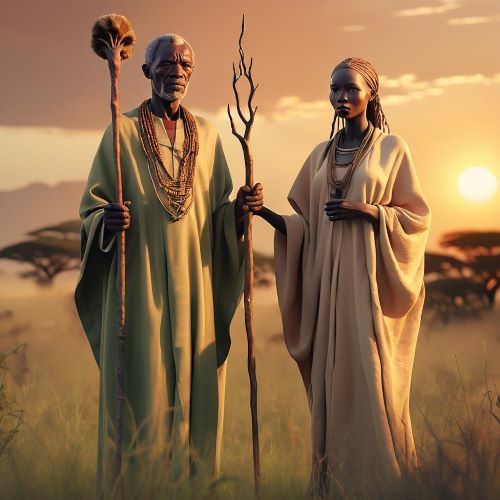Ndeble Spirits
Ndeble Spirits are central to the rich and vibrant mythology of the Ndebele people of Southern Africa. These spirits are believed to be powerful supernatural beings who govern natural elements, human fate, and ancestral communication. Rooted deeply in oral traditions, Ndeble Spirits often appear in stories that explain the mysteries of the world, from the origin of thunderstorms to the protection of sacred lands. Each spirit carries unique traits and serves a specific role in guiding, punishing, or blessing individuals and communities. Their presence continues to influence rituals, festivals, and daily spiritual practices among the Ndebele.
These spirits often manifest in various forms, such as animals, ancestral figures, or nature-based elements like wind, rivers, and mountains. For the Ndebele, everything in the natural world holds spiritual significance, and Ndeble Spirits are seen as guardians of this balance. Some spirits are considered benevolent, bringing rain or fertility, while others are feared for their wrath when taboos are broken. Their dual nature mirrors the complexity of life itself—offering wisdom and warning in equal measure. These beliefs are passed down through generations via folklore, music, and symbolic art.
In many stories, Ndeble Spirits act as intermediaries between the living and the ancestral realm. The spirits serve as a bridge to those who came before, and it is through them that people seek protection, guidance, and healing. Rituals invoking these spirits often involve sacred chants, animal sacrifices, and elaborate dance ceremonies led by spiritual leaders or diviners. The respect for these spirits is deeply ingrained in the culture, and dishonoring them can lead to misfortune or illness, which must be resolved through reconciliation and offerings.
Ndeble Spirits also reflect the values and societal norms of the Ndebele people. Through myths and cautionary tales, they reinforce the importance of community, respect for elders, and harmony with nature. Stories about spirits that punish greed or dishonesty serve as moral compasses for younger generations. As symbols of justice and cosmic balance, these spirits help sustain a cultural identity that remains resilient despite external influences and modernization. They are more than just characters in myth—they are foundational to Ndebele worldview and ethical living.
Today, the legacy of Ndeble Spirits lives on not only in traditional practice but also in modern interpretations through literature, visual arts, and cultural tourism. Scholars and enthusiasts alike continue to explore these legends, appreciating their depth and timeless relevance. As interest in indigenous African spirituality grows, Ndeble Spirits remain powerful icons of ancestral wisdom, environmental reverence, and cultural pride. Whether viewed through a spiritual or academic lens, they offer a fascinating glimpse into the soul of Ndebele heritage.
Ndeble Spirits are central to the rich and vibrant mythology of the Ndebele people of Southern Africa. These spirits are believed to be powerful supernatural beings who govern natural elements, human fate, and ancestral communication. Rooted deeply in oral traditions, Ndeble Spirits often appear in stories that explain the mysteries of the world, from the origin of thunderstorms to the protection of sacred lands. Each spirit carries unique traits and serves a specific role in guiding, punishing, or blessing individuals and communities. Their presence continues to influence rituals, festivals, and daily spiritual practices among the Ndebele.
These spirits often manifest in various forms, such as animals, ancestral figures, or nature-based elements like wind, rivers, and mountains. For the Ndebele, everything in the natural world holds spiritual significance, and Ndeble Spirits are seen as guardians of this balance. Some spirits are considered benevolent, bringing rain or fertility, while others are feared for their wrath when taboos are broken. Their dual nature mirrors the complexity of life itself—offering wisdom and warning in equal measure. These beliefs are passed down through generations via folklore, music, and symbolic art.
In many stories, Ndeble Spirits act as intermediaries between the living and the ancestral realm. The spirits serve as a bridge to those who came before, and it is through them that people seek protection, guidance, and healing. Rituals invoking these spirits often involve sacred chants, animal sacrifices, and elaborate dance ceremonies led by spiritual leaders or diviners. The respect for these spirits is deeply ingrained in the culture, and dishonoring them can lead to misfortune or illness, which must be resolved through reconciliation and offerings.
Ndeble Spirits also reflect the values and societal norms of the Ndebele people. Through myths and cautionary tales, they reinforce the importance of community, respect for elders, and harmony with nature. Stories about spirits that punish greed or dishonesty serve as moral compasses for younger generations. As symbols of justice and cosmic balance, these spirits help sustain a cultural identity that remains resilient despite external influences and modernization. They are more than just characters in myth—they are foundational to Ndebele worldview and ethical living.
Today, the legacy of Ndeble Spirits lives on not only in traditional practice but also in modern interpretations through literature, visual arts, and cultural tourism. Scholars and enthusiasts alike continue to explore these legends, appreciating their depth and timeless relevance. As interest in indigenous African spirituality grows, Ndeble Spirits remain powerful icons of ancestral wisdom, environmental reverence, and cultural pride. Whether viewed through a spiritual or academic lens, they offer a fascinating glimpse into the soul of Ndebele heritage.

